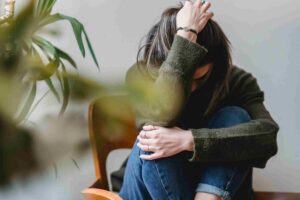Living with bipolar disorder can be a challenging journey, marked by highs and lows that can disrupt every aspect of life. When coupled with compulsive shopping tendencies, the impact can be even more profound, affecting not just financial stability, but also mental health and overall well-being. In this blog, we delve into the intersection of bipolar disorder and compulsive shopping, exploring strategies for managing symptoms, seeking support, and reclaiming control over your life.
Contents
How To Identify If Someone Is Bipolar?
 Identifying bipolar disorder can be challenging, as it often involves a combination of mood symptoms that fluctuate over time. Here are some common signs and symptoms to look out for:
Identifying bipolar disorder can be challenging, as it often involves a combination of mood symptoms that fluctuate over time. Here are some common signs and symptoms to look out for:
- Extreme Mood Swings: Bipolar disorder is characterized by episodes of mania or hypomania (elevated mood) and episodes of depression (low mood). These mood swings can range from extreme highs, where the individual feels euphoric, energized, or irritable, to profound lows, marked by sadness, hopelessness, or loss of interest in activities.
- Changes in Energy and Activity Levels: During manic or hypomanic episodes, individuals may experience a significant increase in energy levels, leading to heightened activity, restlessness, and a decreased need for sleep. Conversely, during depressive episodes, energy levels may plummet, resulting in fatigue, lethargy, and difficulty initiating or completing tasks.
- Impulsivity and Risk-Taking Behavior: Manic or hypomanic episodes often involve impulsivity, poor judgment, and reckless behavior. This may manifest as excessive spending, reckless driving, substance abuse, or engaging in risky sexual encounters without regard for consequences.
- Fluctuations in Self-Esteem: Individuals with bipolar disorder may experience fluctuations in self-esteem and self-worth that coincide with mood swings. During manic episodes, they may feel overly confident, grandiose, or invincible, while during depressive episodes, they may feel worthless, guilty, or self-critical.
- Difficulty Concentrating or Making Decisions: Bipolar episodes can impair cognitive functioning, making it challenging for individuals to concentrate, make decisions, or follow through with tasks. This may interfere with work, school, or daily responsibilities.
- Changes in Sleep Patterns: Disturbances in sleep patterns are common in bipolar disorder. During manic or hypomanic episodes, individuals may experience a decreased need for sleep, insomnia, or restless sleep. Conversely, during depressive episodes, they may oversleep or experience hypersomnia.
- Psychotic Symptoms: In severe cases of bipolar disorder, individuals may experience psychotic symptoms such as hallucinations (seeing or hearing things that aren’t there) or delusions (false beliefs). These symptoms often occur during manic or mixed episodes and may require urgent medical attention.
It’s important to note that not everyone with bipolar disorder will experience all of these symptoms. The severity and frequency of episodes can vary widely between individuals. If you or someone you know is experiencing symptoms of bipolar disorder, seek help from a healthcare provider for proper assessment and support.
Why Do Bipolar People Shop So Much?
There are several reasons why individuals with bipolar disorder may engage in excessive shopping or develop compulsive shopping tendencies:
- Manic Episodes: During manic episodes, which are characterized by elevated mood, increased energy, and impulsivity, individuals with bipolar disorder may experience heightened desires for pleasure and excitement. This can lead to impulsive and excessive spending sprees as they seek to satisfy immediate gratification.
- Self-Medication: Some individuals with bipolar disorder may use shopping as a way to self-soothe or alleviate distressing symptoms, such as depression or anxiety. The act of shopping and acquiring new items may temporarily boost mood or provide a sense of control in otherwise chaotic emotional states.
- Escapism: Shopping can serve as a form of escape from the challenges and stressors associated with bipolar disorder. It may offer a temporary distraction from negative emotions or intrusive thoughts, providing a brief respite from psychological discomfort.
- Identity and Self-Worth: For some individuals, particularly during manic episodes, shopping and acquiring material possessions may be intertwined with feelings of self-worth and identity. The pursuit of luxury items or excessive spending may be driven by a desire to bolster self-esteem or project a certain image to others.
- Impaired Judgment: During manic episodes, individuals with bipolar disorder may experience impairments in judgment, decision-making, and impulse control. This can lead to reckless financial behaviors.
- Biological Factors: There may be underlying neurobiological factors that contribute to both bipolar disorder and compulsive shopping tendencies. Dysregulation in brain regions involved in reward processing, impulse control, and emotional regulation may contribute to the development and maintenance of these behaviors.
It’s important to recognize that not everyone with bipolar disorder will experience compulsive shopping tendencies. And individual experiences may vary widely. Additionally, while shopping may temporarily alleviate symptoms or provide a sense of pleasure, it can also exacerbate financial difficulties.
What Is The Dark Side of Bipolar And Compulsive Shopping?
 The dark side of bipolar and compulsive shopping manifests in various ways. And, often leading to significant negative consequences for individuals affected by these conditions:
The dark side of bipolar and compulsive shopping manifests in various ways. And, often leading to significant negative consequences for individuals affected by these conditions:
- Financial Ruin
Excessive spending during manic episodes can quickly deplete savings, max out credit cards, and accrue overwhelming debt. Compulsive shopping behaviors may lead individuals into financial ruin, jeopardizing their financial stability, and impacting their ability to meet basic needs or maintain their quality of life.
- Interpersonal Conflict
Compulsive shopping can strain relationships with friends, family members, and partners. Loved ones may become frustrated or concerned about the individual’s financial irresponsibility. And, leading to arguments, resentment, and feelings of betrayal or mistrust.
- Guilt and Shame
After the euphoria of a manic episode subsides, individuals may experience intense feelings of guilt, shame, and regret over their impulsive spending behaviors. They may struggle to reconcile their actions with their values, leading to further distress and self-criticism.
- Legal and Professional Consequences
In extreme cases, compulsive shopping may result in legal troubles, such as bankruptcy, foreclosure, or legal action from creditors. Job loss or professional consequences may also occur if the individual’s financial instability interferes with their ability to fulfill work obligations or maintain employment.
- Worsening Bipolar Symptoms
Compulsive shopping behaviors can exacerbate the symptoms of bipolar disorder, leading to increased mood instability, anxiety, and depression. Financial stressors resulting from compulsive shopping may further exacerbate these symptoms. Hence, creating a vicious cycle of emotional distress and impulsive behavior.
- Isolation and Loneliness
Individuals struggling with bipolar disorder and compulsive shopping may withdraw from social interactions due to shame, embarrassment, or fear of judgment. This isolation can exacerbate feelings of loneliness, depression, and low self-esteem, further perpetuating the cycle of compulsive behavior.
- Physical Health Consequences
The stress and anxiety resulting from financial difficulties and interpersonal conflicts can take a toll on physical health. Thus, contributing to symptoms such as insomnia, fatigue, and exacerbation of pre-existing medical conditions.
Addressing the dark side of bipolar and compulsive shopping requires a multifaceted approach, including therapy, medication, financial counseling, and social support.
How To Manage Bipolar And Compulsive Shopping Behaviors?
 Managing bipolar disorder and compulsive shopping behaviors requires a comprehensive approach that addresses both the underlying mental health condition and the compulsive behaviors.
Managing bipolar disorder and compulsive shopping behaviors requires a comprehensive approach that addresses both the underlying mental health condition and the compulsive behaviors.
Several tips
Here are some strategies:
Seek Professional Help
Consult with a mental health professional experienced in treating bipolar disorder and compulsive behaviors. This may include psychiatrists, psychologists, or therapists who can provide a thorough assessment and develop a tailored treatment plan.
Medication Management
Medications such as mood stabilizers, antipsychotics, or antidepressants may be prescribed to help stabilize mood and reduce impulsivity associated with bipolar disorder. It’s important to work closely with a psychiatrist to find the right medication regimen and monitor for any side effects.
Therapy
Cognitive-behavioral therapy (CBT), dialectical behavior therapy (DBT), or other forms of psychotherapy can be beneficial in addressing both bipolar symptoms and compulsive shopping behaviors. Therapy can help individuals identify triggers for impulsive shopping, develop coping skills, and challenge distorted thoughts and beliefs about spending.
Financial Management
Develop a budget and financial plan to regain control over spending habits. This may involve tracking expenses, setting spending limits, prioritizing essential purchases, and avoiding high-risk situations such as online shopping or shopping malls.
Create Shopping Rules
Establish guidelines for responsible shopping behavior, such as waiting 24 hours before making a purchase, setting a maximum spending limit per month, or avoiding shopping alone. Enlist the support of a trusted friend or family member to help hold you accountable to these rules.
Identify Triggers
Become aware of the emotional, situational, and environmental triggers that contribute to impulsive shopping episodes. Common triggers may include stress, boredom, low mood, or social pressure. Once identified, develop alternative coping strategies to manage these triggers effectively.
Practice Mindfulness
Incorporate mindfulness techniques, such as deep breathing, meditation, or progressive muscle relaxation, to increase self-awareness and regulate emotions. Mindfulness can help individuals pause and reflect before engaging in impulsive behaviors.
Build a Support Network
Surround yourself with supportive friends, family members, or peers who understand your challenges and can offer encouragement and assistance when needed. Joining support groups or online forums for individuals with bipolar disorder or compulsive shopping can also provide valuable support and camaraderie.
Engage in Healthy Activities
Find alternative activities that provide enjoyment and fulfillment without the negative consequences of compulsive shopping. This may include hobbies, exercise, volunteering, or spending quality time with loved ones.
Monitor Progress
Regularly assess your progress in managing bipolar disorder and compulsive shopping behaviors. Celebrate small victories and milestones along the way, while remaining vigilant to any signs of relapse or worsening symptoms. Adjust your strategies as needed and continue to prioritize self-care and recovery.
By implementing these strategies and seeking support from mental health professionals and loved ones, individuals with bipolar disorder can effectively manage compulsive shopping behaviors and work towards achieving greater stability and well-being.
Conclusion
In conclusion, managing bipolar and compulsive shopping behaviors requires a multifaceted approach. By seeking professional help, such as therapy and medication management, individuals can gain valuable tools and support to navigate mood fluctuations and impulsive tendencies. Additionally, developing practical strategies for financial management, identifying triggers, and practicing self-care can empower individuals to regain control over their lives.
Remember, progress may be gradual. However, with dedication, perseverance, and the support of loved ones, it’s possible to overcome the challenges of bipolar and compulsive shopping. Ultimately, leading to a healthier and more fulfilling life.
